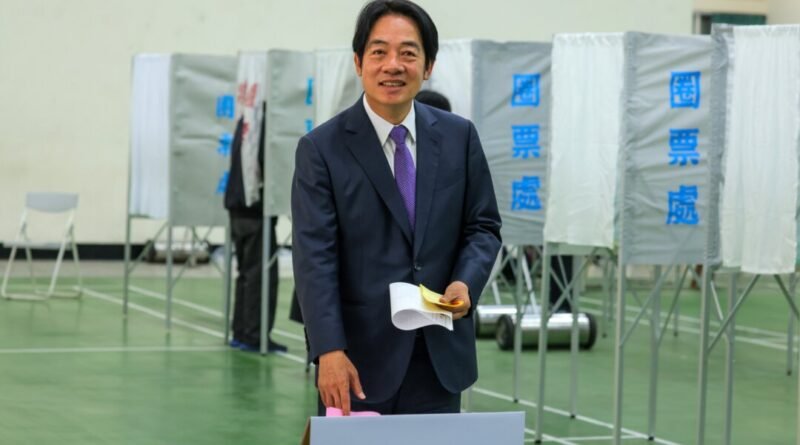William Lai, candidate from Taiwan’s ruling party DPP, emerges victorious in presidential election.
Projections indicate that no party has won a majority.
TAIPEI, Taiwan—The ruling Democratic Progressive Party (DPP) has secured the presidency for another four years, a result that means Taiwan and the United States will likely continue to work closely as partners to deter China.
The DPP presidential candidate, current Taiwan Vice President Lai Ching-te, also known as William Lai, secured over 5.4 million votes, or about 40 percent of the ballot, defeating two other candidates. His victory means that his running mate, Hsiao Bi-khim, who stepped down as Taiwan’s de facto ambassador to the United States in November, will be the new vice president.
Hou Yu-ih, the current New Taipei City mayor and the presidential candidate of the main opposition Kuomintang Party (KMT), finished second with about 4.5 million votes. In third place with about 3.5 million votes is Ko Wen-je, former Taipei mayor and the presidential candidate of the Taiwan People’s Party (TPP), a relatively new party founded in 2019.
The elections came amid the backdrop of China’s increasing aggression and hostility against Taiwan, a self-ruled island that the Chinese Communist Party (CCP) aims to take over. Meanwhile, Taiwan enjoys bipartisan support in Congress in preserving its democracy and way of life.
Mr. Lai’s victory is likely upsetting to the Chinese regime, which traditionally favors KMT candidates. Compared to the DPP, the KMT sees Beijing as less threatening to Taiwan’s national security.
Taiwanese votes also went to polls to choose legislators for Taiwan’s parliament on Saturday. With votes still being counted at the time of writing, projections indicate that no party has won a majority—meaning that the DPP has lost its legislative majority under the Tsai administration.
Taiwan
Several Taiwanese experts spoke to EpochTV’s “Crossroads” program before the elections, providing their analysis of the different election outcomes.
Dr. Lai I-chung, president of the Taiwan-based think tank Prospect Foundation, said that if Mr. Lai were to become the new president, it would signal to the world, including China, that Taiwan would continue to “stand very strong” with its partners.
“Taiwan will continue to uphold democracy, the human rights of freedom, [and] the rule-based international order,” the think tank president said. “If the KMT or the TPP wins the election, I think that will be [a] very, very different signal.”
Mr. Lai warned that if he didn’t win Taiwan would become a loophole, allowing China to obtain technologies and goods under U.S. sanctions.
Puma Shen, one of the DPP legislator-at-large nominees and director of the Graduate School of Criminology at Taiwan’s National Taipei University, said that a Lai victory would mean Taiwan continue working with its friends and allies, working together as a deterrence against China.
Mr. Shen emphasized that Taiwan would continue to face the risk of a CCP invasion. He explained that CCP head Xi Jinping might be deceived by his own military officials, wrongfully believing that China would be guaranteed a victory if it were to attack Taiwan.
In other words, Mr. Shen said the election results on Saturday wouldn’t be the most important issue regarding a potential invasion; rather, what matters would be what’s happening domestically in China, he said.
US Support
Earlier this week the Biden administration confirmed its plans of sending an official delegation to Taiwan after the elections, to meet with both the president-elect and other candidates. According to Kathleen Waters, the deputy spokesperson for the National Security Council (NSC), the delegation will made up of former high-ranking officials.
According to the language of the resolution, the Senate was committed to “continuing a strong partnership across diplomatic, information, economic, and cultural domains, regardless of the outcome of Taiwan’s 2024 elections.”
The solution was led by Mr. Sullivan and Sen. Tim Kaine (D-Va.). Other co-sponsors included Sens. Tim Scott (R-S.C.), Kevin Cramer (R-N.D.), Chris Coons (D-Del.), and Chris Van Hollen (D-Md.).
“Between the election on January 13th and the inauguration in May, the United States needs to show steady, unwavering commitment and resolve in support of Taiwan’s democracy and—critically—we need to enhance cross-strait deterrence now,” Mr. Sullivan said in a statement.
“Every Taiwan election threatens the central premise of the Chinese Communist Party—that one dictator ruling in perpetuity knows what’s best for 1.4 billion people,” Mr. Sullivan added. “Millions of Chinese on the mainland will be watching Taiwan’s upcoming election and asking the question, ‘Why can’t we do that?’ This is a giant vulnerability for Xi Jinping.”
Reps. Gerry Connolly (D-Va.), Mario Diaz-Balart (R-Fla.), Ami Bera (D-Calif.), and Andy Barr (R-Ky.), co-chairs of the Congressional Taiwan Caucus, introduced a similar resolution in the House on Jan. 10.
“Now more than ever, it is imperative that the United States stands in total solidarity with Taiwan and its commitment to democracy,” Mr. Connolly said in a statement on Wednesday.
Mr. Connolly added, “In the face of relentless threats and intimidation from the People’s Republic of China, Taiwan’s leadership as a global leader in public health, advanced manufacturing, and democratic governance underscore the importance of protecting democratic institutions and rejecting authoritarianism at home and abroad.”
Mr. Díaz-Balart told The Epoch Times before the elections that support for Taiwan was “absolutely bipartisan” in Congress.
“I don’t think there’s confusion in Congress as to the nature of the Communist Party in China,” Mr. Díaz-Balart said. “I would say it’s an aggressive, evil dictatorship that murders its own people, that threatens its neighbors, that tries to spread its influence through any means possible.”






